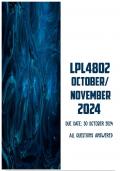Exam (elaborations)
LPL4802 October/November 2024 | Due 30 October 2024
- Module
- Institution
LPL4802 October/November 2024 | Due 30 October 2024. All questions answered. QUESTION 1 (ESSAY) NATURE AND ASSESSMENT OF NON-PATRIMONIAL LOSS AND DAMAGES FOR PATRIMONIAL LOSS (4 pages, including rubric) PLEASE NOTE: You must present your answer in the form of an essay. Its marking rubric is ...
[Show more]



